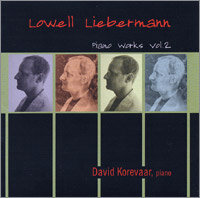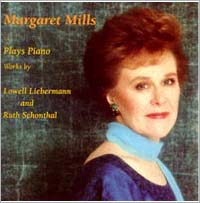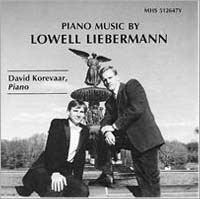Sonata No.1 for piano solo Op.1 (1977) c. 12'00"
I. Adagio
II. Presto
III. Lento
IV. Presto strepitoso
Dedicated to Stephen Hough
First performed on May 15th, 1977 at Carnegie Recital Hall in New York City by the composer
Outstanding Composition Award, Yamaha Music Foundation, Tokyo, Japan, 1982
First Prize, National Composition Contest, Music Teachers National Association, 1978
RECORDINGS
REVIEWS
“The first half ended with Lowell Liebermann’s Piano Sonata, Op.1, composed at age fifteen (1976). An auspicious start to the impressive career that ensued, this work contains more than just seeds of future greatness, as it has moments of haunting beauty (especially in the third movement, Lento), along with taut craftsmanship.”
New York Concert Review
“Liebermann’s Piano Sonata No.1, composed when he was 15, is a tightly organized, technically spectacular and rather brash work that respects but stretches the traditional classical forms.”
The Washington Post
“The piano works of American Composer Lowell Liebermann (b.1961) are significant and poetic additions to the keyboard repertoire. One of the most successful composers of his generation, Liebermann is also controversial, especially in “progressive” musical circles. His music is mostly tonal, beautiful, and - unforgivable to some critics and academics - popular and accessible…Liebermann is often categorized as a postmodern tonalist or neoromantic, but such pigeonholing can diminish the distinctive qualities and traits of such an individual composer. His works maintain a strong sense of structural and emotional balance and proportion. The ability to write beautiful, soaring, and memorable melodies attests to his great lyric affinity. Throughout his music, Liebermann makes imaginative use of a rich a varied harmonic and textural palette, and he often demands superior technical ability from his performers. Liebermann’s work for piano are written with a masterly command of idiomatic keyboard writing. He is a formidable pianist who understands (and exploits) the coloristic and virtuoso possibilities of the instrument…This vigorous and appealing work (which is tonal, but has bite) shows Liebermann’s early fondness for lyricism, virtuosity and formal balance. Liebermann’s First Piano Sonata…is an excellent work, well worthy of study and performance…”
William T. Spiller, Notes


